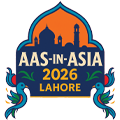Conference Abstract & Themes

Centering Asia: Refiguring Connections, Recharting Futures
At AAS-in-Asia 2026 in Lahore, we invite scholars to engage with Asia's significance as a site of continuity and reinvention in global history. With an estimated population of more than 4.8 billion, Asia is home to some of the world's largest economies and vibrant cultural traditions and knowledge systems. Like other continents, Asia also faces dilemmas as well as acute vulnerabilities to environmental stressors, displacement, and precarity—challenges that defy conventional borders and demand collaborative responses. We call upon researchers to join us in exploring multi-layered pasts by following local connections wherever they may lead, revealing transnational geographies that center Asia beyond both nation-state and conventional area studies boundaries.
Our host city, Lahore, is significant in South Asia and beyond for having served not only as a political capital at different moments in history, but also as a cultural heartland where diverse traditions have long converged and reshaped one another. On the one hand, it shows how invasions shaped politics and where cultures met, clashed, and fused, and on the other, it embodies Asia’s struggles with colonialism and modernity. As a major Mughal city and center of Persianate culture, Lahore connected through northern routes to Central Asia and Silk Road networks. As a river port on the Ravi, it linked to Arabian Sea trade through the Indian Ocean. Under Sikh rule, and later within the British colonial order, Lahore remained a hub where power, knowledge, and culture mingled.
'Centering Asia' offers an alternative to area studies fragmentation and abstract, commonly accepted global frameworks. Exploring networks across transnationals, Asian Studies scholarship can reveal often over-looked ties linking regions through land and maritime trade, migration, religious networks, and linguistic as well as cultural traditions. Instead of accepting imposed boundaries, new knowledge corridors can travel through Indian Ocean, West Asia and the Gulf, and further west to East and North Africa as well as across the Atlantic to Latin America. Bringing these geographies into focus reveals not distant regions, but interconnected terrains shaped by shared historical experiences of movement, exchange, and encounter that continue to transcend modern borders. This refiguring of connections shows how layered and uneven histories and memories can be mobilized to sketch alternative futures.
As older frameworks of knowledge and power give way to plurality of pathways and local voices, we ask: Can Asia's deeper patterns of connection and solidarity be remobilized? We call for papers to revisit familiar geographies through innovative questions, to build bridges between archives and communities, and to generate fresh vocabularies for imagining just and livable futures. This is also a moment of reconciliation. The Association for Asian Studies (AAS) and Lahore University of Management Sciences (LUMS) are committed to building bridges that facilitate academic conversations and cultural exchange to ensure that everyone, regardless of their nationalities, can engage with fellow conference participants either in-person or online. AAS-in-Asia Lahore 2026 envisions creating new connections today, that may themselves become tomorrow's historical ties, fostering scholarly networks that eclipse current divisions.
THEMES
The potential themes for the conference include, but are not limited to:
- Asia’s Transformation and Global Perspectives: How Asia’s economic, political, and cultural shifts reshape global debates and reposition Asia in relation to West Asia, Africa, Latin America, and the Global North.
- Conflict and Cooperation: Border disputes, wars, and contested sovereignties, alongside traditions of coexistence, reconciliation, and peacebuilding.
- Democratic Backsliding: Shrinking civic spaces, exclusionary nationalisms, and institutional erosion, as well as resistance, reform, and alternative imaginaries.
- Technology, Society, and Power: Digital technologies, AI, and infrastructures as tools of connection, participation, surveillance, and exclusion.
- Asian Ecologies: Climate disruption, displacement, and precarity, with attention to resilience, adaptation, and just futures.
- Cities, Infrastructures, and Inequality: Urban growth and megaprojects as drivers of inequality and displacement, and possibilities for inclusive, people-centered futures.
- Gender, Power, and Marginality: Gendered inequalities and struggles for justice, centering marginalized voices as agents of transformation.
- Cultural Contexts and Artistic Expression: Literature, art, performance, and everyday practices as spaces of creativity, critique, and solidarity across borders.
- Epistemologies: Old and New: Indigenous knowledge systems, archives, and critical theories as alternative pathways for Asian Studies.

